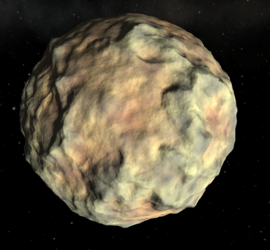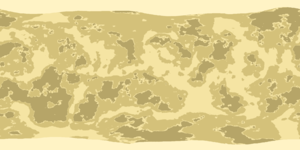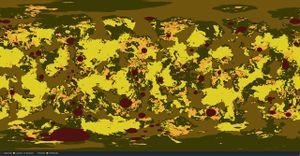Difference between revisions of "Pol"
GrumpyGorlox (talk | contribs) |
(Moved KSP2 information to subpage Pol/KSP2) |
||
| (103 intermediate revisions by 45 users not shown) | |||
| Line 1: | Line 1: | ||
| + | {{KSP2_version}} | ||
| − | {{ | + | {{Infobox/Body}} |
| − | |||
| − | |||
| − | |||
| − | |||
| − | |||
| − | |||
| − | |||
| − | |||
| − | |||
| − | |||
| − | |||
| − | |||
| − | |||
| − | |||
| − | |||
| − | |||
| − | |||
| − | |||
| − | |||
| − | |||
| − | | | + | '''Pol''' is the smallest of the five [[w:Natural satellite|natural satellites]] of [[Jool]]. The terrain is proportionally quite rough, with large ridges that make it resemble a pollen grain. |
| − | | | + | |
| − | + | Pol has the second-lowest surface gravity in the [[Kerbol]] system: only [[Eve]]'s moon [[Gilly]] is less massive. This makes bipropellant engines on a lander somewhat unnecessary, as landing can be completed with [[RCS]] thrusters only. Landing on Pol may still be difficult for inexperienced pilots due to the hazardous terrain with mountains, canyons, 45° slopes and jagged rocks, as well as its tiny sphere of influence. Pol is in a high orbit around Jool with moderate eccentricity and inclination, which indicates it may be a captured asteroid like [[Gilly]] and [[Bop]]. Pol is [[w:Tidal locking|tidally locked]] to [[Jool]]. Its high orbit and low gravity makes it a convenient moon for mining ore to supply a refinery/refueling depot in a higher Jool orbit.<ref>Which would be convenient both for inbound craft headed for the inner Jool system, as well as outbound craft headed for [[Eeloo]] or (if you have the mod installed) one of the outer planets.</ref> | |
| − | | | + | |
| − | + | Pol was added in 0.18. It was not part of the original Joolian system when it was released, along with all the other planets, except the Kerbin system, in 0.17. | |
| − | + | ||
| − | | | + | |
| − | }} | + | == In-game Description == |
| + | |||
| + | {{Quote | ||
| + | |This moon was especially hard to spot, as it looks just like a pollen grain, particularly when observed through telescopes based near dusty fields.<br /> | ||
| + | <br /> | ||
| + | ''Pol was finally discovered when someone decided to write down the location of the pollen, after having given up on yet another failed attempt to be rid of the smudge.'' | ||
| + | |[[Kerbal Astronomical Society]]}} | ||
| − | |||
| − | |||
| − | |||
== Topography == | == Topography == | ||
| − | |||
| − | |||
| − | + | [[File:Pol with Jool and moons.png|thumbnail|left|Pol's uneven surface with Jool and and its three large moons in the background.]] | |
| − | + | Pol has many unique characteristics. The surface is wrinkled and uneven. It has many spiked mountains and very large cliffs that can reach up to 4 km high, and many kilometers wide. Many mountain ranges are circular and form bowl-shaped valleys. Its surface color ranges from brown over pale yellow to pale green. It appears to be composed of various phosphoric or sulfuric compounds and is covered in peculiar spire-shaped rocks. The terrain scatter resembles spiky, twisted rocks and the surface is very difficult to navigate with a rover due to the terrain and low gravity. | |
| − | + | ||
| − | + | Although very uneven, the surface of Pol is still not as irregular as that of [[Bop]], despite its lower gravity. This suggests volcanic activity that re-paved the surface, or that Pol was formed via low-velocity accretion at relatively low temperatures. | |
| − | + | ||
| − | + | <div style="clear:left;"></div><!-- Place Reference Frames below image of Topography --> | |
| − | + | ||
| − | + | ||
| − | + | == Biomes == | |
| − | + | ||
| − | + | Pol has 4 [[biome]]s. | |
| − | + | ||
| − | + | ||
| − | + | === Biome list === | |
| − | + | ||
| − | + | {| | |
| − | + | | style="vertical-align:middle; text-align:center;" | | |
| − | | | + | [[File:Pol Biome Map 1.2.1.png|thumb|left|Pol biome map as of 1.2.1]] |
| − | |- | + | | |
| − | | | + | * Poles |
| − | | | + | * Lowlands |
| − | | | + | * Midlands |
| − | | 1 | + | * Highlands |
| − | | | ||
| − | |||
| − | |||
| − | |||
| − | |||
| − | |||
| − | |||
|} | |} | ||
| − | |||
| − | == | + | === Maps === |
| + | ==== Biomes ==== | ||
| + | [[File:pol_region_ui.jpg|thumb|none|Pol biome map with legend (as of v0.2.1.0 (from Orbital Survay mod))]] | ||
| + | [https://i.imgur.com/gxToM3a.jpeg Pol biome map (Imgur)] | ||
| + | |||
| + | ==== Visual map ==== | ||
| + | [[File:pol_visual.png|thumb|none|Pol visual map (as of v0.2.1.0)]] | ||
| + | [https://i.imgur.com/LNuALN5.png Pol visual map (Imgur)] | ||
| + | |||
| + | == Reference Frames == | ||
| + | {{:Pol/RefFrame}} | ||
| − | + | An orbit under 3000 meters is unwise, as it will almost always result in colliding with a mountain, spire, or plateau. | |
| + | |||
| + | == Trivia == | ||
| + | * According to its ingame description it was a long time before Pol was officially discovered, as astronomers kept trying to wipe it off their telescopes, thinking that it was a grain of pollen. Pol's name may refer to this uncanny resemblance, even though the kerbal word for pollen would actually be "Nelop". | ||
== Gallery == | == Gallery == | ||
<gallery> | <gallery> | ||
| − | File:Pol Landing.png |A successful landing on | + | File:Pol Landing.png | A successful landing of a user created RCS Lander on Pol. |
| − | File: Pol Landing2.png | + | File:Pol Landing2.png | A map view of Pol contrasted to Jool. |
| − | File: Pol Adventure.png | + | File:Pol Adventure.png | A motion image of a Kerbal astronaut enjoying Pol's outrageously low gravity. |
| − | File: | + | File:Pol_800_map.gif | A topographic height map of Pol as of Version 0.18.1 made with the ISA MapSat plugin. |
| − | File: | + | File:Small lander on Pol.png | A successful landing on Pol. |
| − | File: | + | File:Sun from lander on Pol.png | A probe lander looking into a dark, sinister looking mountain spire. |
| + | File:Lander on Pol's cliff.png | Spiky rocks on Pol's surface. | ||
| + | File:PolOrbit.png | Jebediah Kerman floating in front of a large spacecraft while orbiting Pol. In the background you can see Jool. | ||
| + | File:Landing On Pol.png | Two Kerbals and a lander on Pol. | ||
| + | File:2021-12-18 (1).png | A crashed rover on Pol with [[Jool]] in the background | ||
| + | File: MTMPol.jpeg |thumb|A probe in orbit of Pol after flying past the other moons of Jool. The high texture quality added in 1.12 can be seen. | ||
| + | </gallery> | ||
| + | <gallery> | ||
</gallery> | </gallery> | ||
== Changes == | == Changes == | ||
| − | ; | + | ;[[1.12]] |
| + | * Texture revamp | ||
| + | ;[[0.90]] | ||
| + | * Added biomes | ||
| + | ;[[0.18.2]] | ||
* Mass increased by ~3.16x, semi-major axis increased. | * Mass increased by ~3.16x, semi-major axis increased. | ||
| − | ; | + | ;[[0.18]] |
* Initial Release | * Initial Release | ||
| − | |||
| − | |||
| − | |||
| − | |||
| − | |||
| − | |||
| − | |||
| − | |||
| − | |||
{{Celestial Bodies}} | {{Celestial Bodies}} | ||
[[Category:Celestials]] | [[Category:Celestials]] | ||
[[Category:Moons]] | [[Category:Moons]] | ||
| + | == Notes == | ||
Latest revision as of 17:57, 21 March 2024
You may be looking for the KSP 2 version:
→ KSP2 version
| Pol | ||
| Pol as seen from orbit. | ||
| Moon of Jool | ||
| Orbital Characteristics | ||
| Semi-major axis | 179 890 000 m [Note 1] | |
| Apoapsis | 210 624 207 m [Note 1] | |
| Periapsis | 149 155 794 m [Note 1] | |
| Orbital eccentricity | 0.171 | |
| Orbital inclination | 4.25 ° | |
| Argument of periapsis | 15 ° | |
| Longitude of the ascending node | 2 ° | |
| Mean anomaly | 0.9 rad (at 0s UT) | |
| Sidereal orbital period | 901 903 s | |
| 41 d 4 h 31 m 42.6 s | ||
| Synodic orbital period | 909 742.2 s | |
| Orbital velocity | 1 055 - 1 489 m/s | |
| Longest time eclipsed | 11 381 s | |
| Physical Characteristics | ||
| Equatorial radius | 44 000 m | |
| Equatorial circumference | 276 460 m | |
| Surface area | 2.4328494×1010 m2 | |
| Mass | 1.0813507×1019 kg | |
| Standard gravitational parameter | 7.2170208×108 m3/s2 | |
| Density | 30 305.392 kg/m3 | |
| Surface gravity | 0.373 m/s2 (0.038 g) | |
| Escape velocity | 181.12 m/s | |
| Sidereal rotation period | 901 902.62 s | |
| 41 d 4 h 31 m 42.6 s | ||
| Sidereal rotational velocity | 0.30653 m/s | |
| Synchronous orbit | Outside sphere of influence | |
| Sphere of influence | 1 042 138.9 m [Note 1] | |
| Atmospheric Characteristics | ||
| Atmosphere present | No | |
| Scientific multiplier | ||
| Surface | 12 | |
| Splashed | N/A | |
| Near space | 9 | |
| Outer space | 8 | |
| Recovery | 8 | |
|
| ||
Pol is the smallest of the five natural satellites of Jool. The terrain is proportionally quite rough, with large ridges that make it resemble a pollen grain.
Pol has the second-lowest surface gravity in the Kerbol system: only Eve's moon Gilly is less massive. This makes bipropellant engines on a lander somewhat unnecessary, as landing can be completed with RCS thrusters only. Landing on Pol may still be difficult for inexperienced pilots due to the hazardous terrain with mountains, canyons, 45° slopes and jagged rocks, as well as its tiny sphere of influence. Pol is in a high orbit around Jool with moderate eccentricity and inclination, which indicates it may be a captured asteroid like Gilly and Bop. Pol is tidally locked to Jool. Its high orbit and low gravity makes it a convenient moon for mining ore to supply a refinery/refueling depot in a higher Jool orbit.[1]
Pol was added in 0.18. It was not part of the original Joolian system when it was released, along with all the other planets, except the Kerbin system, in 0.17.
Contents
In-game Description
| “ | This moon was especially hard to spot, as it looks just like a pollen grain, particularly when observed through telescopes based near dusty fields.
|
” |
Topography
Pol has many unique characteristics. The surface is wrinkled and uneven. It has many spiked mountains and very large cliffs that can reach up to 4 km high, and many kilometers wide. Many mountain ranges are circular and form bowl-shaped valleys. Its surface color ranges from brown over pale yellow to pale green. It appears to be composed of various phosphoric or sulfuric compounds and is covered in peculiar spire-shaped rocks. The terrain scatter resembles spiky, twisted rocks and the surface is very difficult to navigate with a rover due to the terrain and low gravity.
Although very uneven, the surface of Pol is still not as irregular as that of Bop, despite its lower gravity. This suggests volcanic activity that re-paved the surface, or that Pol was formed via low-velocity accretion at relatively low temperatures.
Biomes
Pol has 4 biomes.
Biome list
|
Maps
Biomes
Visual map
Reference Frames
| Time warp | Minimum Altitude |
|---|---|
| 1× | Any |
| 5× | 5 000 m |
| 10× | 5 000 m |
| 50× | 5 000 m |
| 100× | 8 000 m |
| 1 000× | 12 000 m |
| 10 000× | 30 000 m |
| 100 000× | 90 000 m |
An orbit under 3000 meters is unwise, as it will almost always result in colliding with a mountain, spire, or plateau.
Trivia
- According to its ingame description it was a long time before Pol was officially discovered, as astronomers kept trying to wipe it off their telescopes, thinking that it was a grain of pollen. Pol's name may refer to this uncanny resemblance, even though the kerbal word for pollen would actually be "Nelop".
Gallery
A crashed rover on Pol with Jool in the background
Changes
- Texture revamp
- Added biomes
- Mass increased by ~3.16x, semi-major axis increased.
- Initial Release














